“Looking for par’Mach in All the Wrong Places”
Written by Ronald D. Moore
Directed by Andrew J. Robinson
Season 5, Episode 3
Production episode 40510-501
Original air date: October 14, 1996
Stardate: unknown
Station log: Bashir and Quark pass by the O’Brien cabin, where they can both hear Kira and O’Brien arguing rather loudly. Keiko arrives—causing great chagrin to Bashir, who doesn’t want to be caught eavesdropping—and settles things, but it’s obviously not all sweetness and light with the new arrangement among the O’Briens and Kira.
Worf and Dax are discussing opera singers in the replimat when the Lady Grilka shows up on the Promenade alongside Tumek and a bodyguard, Thopok. Worf is completely smitten with her, and follows her and her entourage to Quark’s, where she warmly greets the proprietor with a big ol’ hug. Dax informs a shocked Worf that Grilka is Quark’s ex-wife. She tells him the whole story of “The House of Quark,” while Grilka herself tells Quark that the recent hostilities between the Klingons and the Federation have cost the House of Grilka quite a bit and Quark offers to look over her books. After Grilka takes her leave, Thopok threatens Quark—if he helps her, all is well, but if he fails to aid her, Thopok will kill him.
O’Brien is picking up some medications for Kira from Bashir, and Bashir is surprised to learn that O’Brien is helping Kira out of the tub and—because he’s twelve—wants to know if O’Brien peeked at her naughty bits.
Worf goes to Quark’s to flirt with Grilka. Him being Klingon and all, flirting means literally tossing Morn out of his seat (promising to apologize for that later), loudly ordering bloodwine, and insulting Thopok. However, Tumek cuts him off at the pass and takes him aside. Worf’s House has been dissolved, his name is a curse. Grilka could not even consider mating with him. Tumek also knows that he’s never courted a Klingon woman before, and politely, without insult, asks him to leave and not come back.
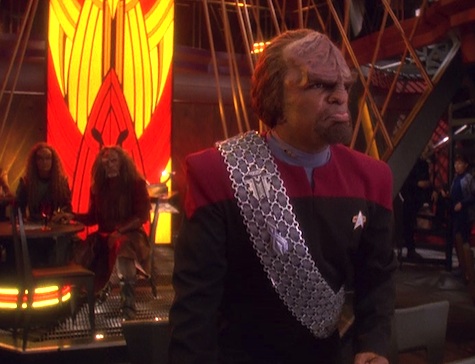
Worf sulks. Dax isn’t sure if it’s because his overtures were rejected or if it’s the reminder of his being raised by humans or if it’s the reminder that he’s an outcast. To twist the knife a little, Quark shows up asking Dax for pointers because Grilka has invited him to dinner in her quarters. Worf winds up participating, telling Quark of a ritual that is common among the people of her region of Qo’noS.
O’Brien is giving Kira a massage, while Keiko brings her yet another new, larger uniform straight from Garak, along with more comfortable boots. O’Brien tells Kira about Ireland, and the conversation wanders to a surprisingly flirty direction, before both of them cut each other off and feel all awkward.
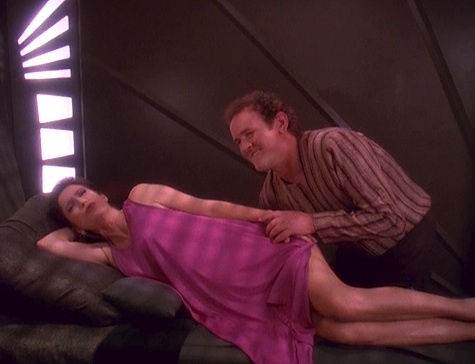
Quark goes to Worf on the Defiant. The first date went really well. She said that Quark had the heart of a poet, which prompts Worf to mentally go “nyah! nyah!” at Tumek, and Quark asks for help with date number two. “We have work to do,” Worf says with determination.
Enlisting Dax, they go to the holosuite to re-create the battle at Qam-Chee, where Kahless and Lukara fought against five hundred soldiers, defeating them all, and beginning the greatest romance in Klingon history. Quark is having trouble with the whole thing—a vicious battle that ends with him covered in blood and surrounded by corpses doesn’t exactly put him in a romantic mood—until Dax reminds him that the story of Qam-Chee ends with Kahless and Lukara jumping on each other like a couple of crazed voles.
Kira winds up defending O’Brien to Odo, who is frustrated with how far behind the chief is on repairs to Upper Pylon 3, which has had a rash of thefts. Meanwhile, Quark and Grilka come out of the holosuite after acting out Kahless and Lukara at Qam-Chee. Grilka then asks Quark point blank why he’s pursuing her. Having playacted at being a Klingon all night, he goes full Ferengi on her: he pursues those valuable objects that he wishes to acquire.
That’s too much for Thopok, who declares that he cannot protect a House that would accept an honorless coward like Quark. So he challenges Quark to a duel, because Klingons.
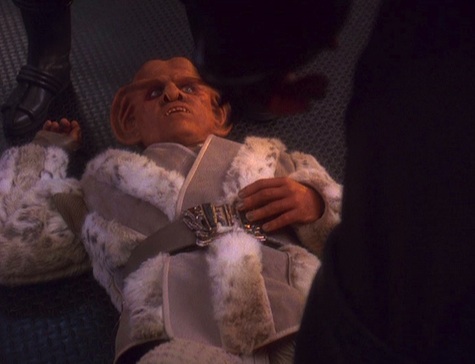
Kira and O’Brien remain awkward around each other since their unintentional flirting, and Kira decides to spend a few days in a remote cabin on Bajor to relax for a while. O’Brien is relieved—but then Keiko insists that O’Brien go with her just in case, which just starts the awkward train rolling again.
Quark is in a bind. Heartsick, he consults Worf and Dax. “My choices are to not show up, be branded a coward, and lose Grilka—or die?”
“Yes,” Worf says simply, and Quark cries out, “Oh, come on now, there must be another way out of this!”
Dax has an idea: a telepresence device that allows Worf to control Quark’s movements. After a practice session—during which Quark, naturally, complains a lot—Dax asks Worf what he sees in Grilka, and his very poetic description sounds to her like a statue. She tells him he’d be better off with someone more fun and more attainable. Worf, amazingly, does not get the hint.
Quark goes to the holosuite and formally accepts Thopok’s challenge. With Worf controlling him from the holosuite next door, Quark fights Thopok, and it goes really well right up to the part where Worf accidently breaks a piece of the device with a show-offy bat’leth twirl. Quark stalls by pulling “the Ferengi Right of Proclamation” out of his ass, and Grilka allows it, given how respectful he has been of Klingon traditions (and how little she knows of Ferengi ones). He starts extemporizing a declaration of his affection for Grilka, parts of which are very clever, and parts of which really aren’t.
Then Dax fixes the device, and they’re back to fighting. Worf and Quark defeat Thopok, but Quark does not deliver the killing blow, much to Quark’s surprise. Instead Worf has him pick up Thopok’s bat’leth, bring it to Grilka and present it to her, grip-first. She returns the weapon to him, declaring his honor to be satisfied and his service to the House of Grilka at an end. Thopok isn’t happy, but he bows and departs. Tumek also leaves, and Dax turns the machine off, leaving Quark and Grilka to themselves.
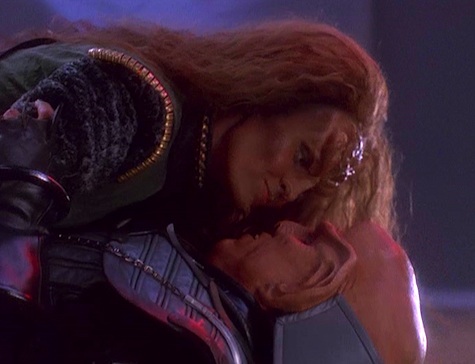
Worf laments what Grilka sees in Quark, and Dax points out that at the very least Quark can see an opportunity that’s staring him in the face. Worf still doesn’t get it, so Dax has the computer give her a bat’leth and she recites Lukara’s lines from the Battle at Qam-Chee. Smiling, Worf finally gets the hint, and recites Kahless’s lines, followed by the pair of them sparring for a bit, ending with Dax on top of Worf.
O’Brien and Kira board a runabout. The awkwardness is now cranked up to eleven. Kira laments that the cabin she was planning to go to is the most romantic spot on Bajor. O’Brien says that there’s no way he’s going—he’ll deal with Keiko, but he won’t go. Kira also decides to instead go to the capital city and visit Shakaar. They also admit that it might’ve been nice in another life, before Kira kicks O’Brien off the runabout.
Quark checks into the infirmary with multiple scratches, fractures, and contusions, alongside Grilka. Bashir asks what happened, and then rescinds the question, not wanting that image running around in his head. Worf and Dax then enter in a similarly battered state, prompting Bashir to decide to never ask anyone what happened to them ever again.
Worf tells Dax that traditionally, they would now get married, but Dax is not a traditionalist—and, she points out, neither is he, really. They agree to take it one day at a time, though Worf isn’t a hundred percent happy with that arrangement. Dax does get him to admit that he stopped thinking about Grilka, at which point we’re treated to that rarest of sights: Worf laughing.
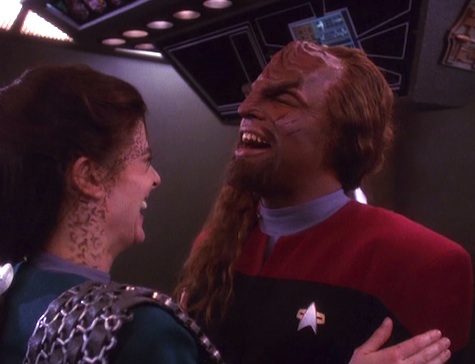
Can’t we just reverse the polarity? Dax has a doohickey that never is even given a name that allows one person to manipulate the limbs of another. We never find out how it works or what it’s called or where Dax got it or if she just built it or what. It’s just there because the plot needs it to be there. And you know what? That’s okay.
Don’t ask my opinion next time: Kira is getting into the latter stages of pregnancy, and she’s mostly miserable, relying on O’Brien’s massages to keep her sane. She’s also continuing to sneeze a lot, despite every remedy Bashir tries. (At one point, Bashir says that Bajoran women have been sneezing their way through pregnancy for a hundred thousand years and he can’t be expected to cure it overnight.)
The slug in your belly: Dax, who has been flirting with Worf for a year now, turns it up a notch, though it still takes forever for him to get the hint. What’s especially entertaining is how totally smitten she is when Worf demonstrates what Quark should do on the first date with Grilka.
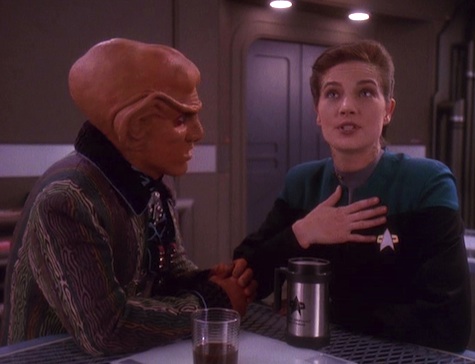
There is no honor in being pummeled: Worf is taken with Grilka from the moment he sees her, even though he doesn’t really know her. Of course, the more he knows, the more he likes what he sees, and if he can’t have her, he’ll at least prove to himself that Tumek was wrong and he totally could have wooed her given a chance by being Quark’s puppeteer.
Rules of Acquisition: Quark is obviously as taken with Grilka as Worf, if not more so, since he actually knows her, and goes to impressive lengths to win her. Of course, it’s as much Worf who wins her as Quark, but Quark’s the one who gets to have sex with her in the end.
Preservation of mass and energy is for wimps: Odo takes tremendous pleasure in giving Kira a hard time about how much more friendly she is toward “Miles” than she used to be toward “the chief.”
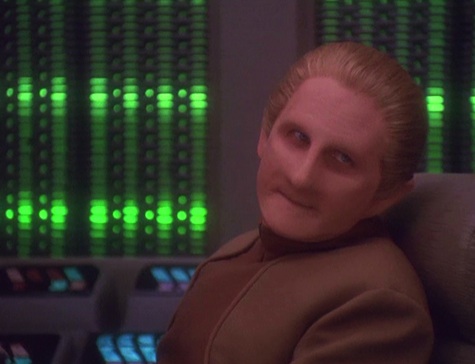
Plain, simple: Apparently, it’s been six months since “Broken Link,” since Garak is back in business, making new uniforms and boots for Kira.
Tough little ship: Living on the Defiant allows Worf to, when the ship isn’t in use, blare Klingon opera over the communications systems and sing along to it—the very thing Dax said he could do when he moved to the ship in “Bar Association.”
No sex, please, we’re Starfleet: Where to even start? Let’s put it this way, between Worf and Grilka, Quark and Grilka, Dax and Worf, and O’Brien and Kira, this episode was the sole item cited in Steve Lyons & Chris Howarth’s Completely Useless Unauthorized Star Trek Encyclopedia’s entry for “Sex.”
What happens on the holosuite stays on the holosuite: Quark re-creates, at Worf’s suggestion, the battlements at Qam-Chee for his and Grilka’s second date, and later it’s where Thopok’s challenge to Quark takes place.
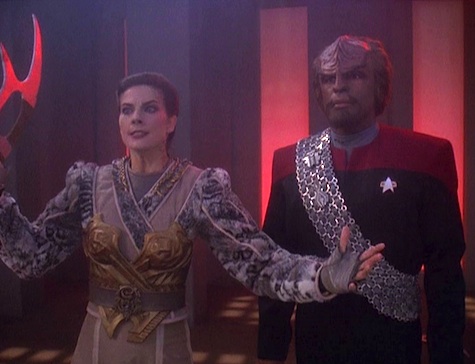
Keep your ears open: “War. What is it good for? If you ask me, absolutely nothing.”
Quark, paraphrasing the great Edwin Starr song “War” (and also forgetting about the 34th Rule of Acquisition, “War is good for business”).
Welcome aboard: Mary Kay Adams and Joseph Ruskin return as Grilka and Tumek from “The House of Quark.” Rosalind Chao returns as Keiko.
But the episode’s Robert Knepper moment is Phil Morris, a favorite actor of mine since his days following in his father’s footsteps in the 1988 Mission: Impossible sequel series (Greg Morris played Barney Collier on the original M:I, and Phil played Collier’s son Grant in the sequel series). While I distinctly remember Morris’s other Trek roles—as one of the kids in the original series’ “Miri,” as the cadet in Star Trek III, as John Kelly in Voyager’s “One Small Step,” and especially his magnificent turn as Third Remata’klan in “Rocks and Shoals”—I had totally forgotten that he also plays Thopok in this episode.
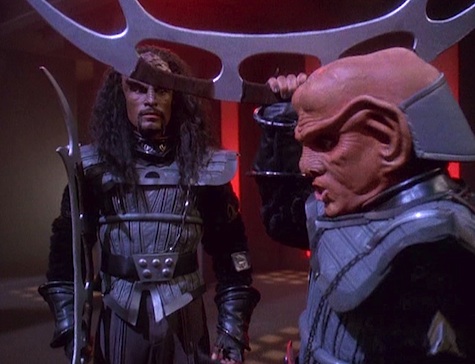
Trivial matters: This episode serves as a sequel to “The House of Quark.” While we won’t see Grilka again on screen, regular rewatch commenter Christopher L. Bennett wrote a coda to the Grilka-Quark relationship for the Prophecy and Change anthology entitled “…Loved I Not Honor More.” Grilka is also part of the storyline of Star Trek Online.
The episode was very obviously inspired by Edmond Rostand’s Cyrano de Bergerac, a suggestion originally made by Michael Dorn. In TNG’s “The Nth Degree,” we saw Crusher directing a production of Cryano on the Enterprise, with Barclay in the title role.
This is the second mention of Lukara, Kahless’s mate, who was first named in “The Sword of Kahlees,” when Kor mentioned that Kahless used his bat’leth to carve a statue of her. Your humble rewatcher’s The Klingon Art of War expands on the battle at Qam-Chee, explaining how Kahless and Lukara met there, and the full circumstances of the battle against Molor’s forces. Qam-Chee is established, in the 22nd century at least, as being the site of the First City of the Klingon Empire in the Enterprise novels Kobayashi Maru by Andy Mangels & Michael A. Martin and the duology The Romulan War by Martin. The Qam-Chee River flows through the First City in the 24th century in your humble rewatcher’s A Burning House.
This is Andrew Robinson’s first time directing an episode of DS9, and the first time a recurring actor has directed a Trek episode. (By this time, plenty of opening-credits regulars had taken their turn in the director’s chair, and many more would going forward.) It was also Robinson’s first TV directorial endeavor. Fittingly, his first time was a riff on a stage play, since he’s an award-winning stage director, having won two Los Angeles Drama Critics Circle Awards for helming Harold Pinter’s The Homecoming and Samuel Beckett’s Endgame.
This is the longest episode title in DS9’s run, and the second-longest in all of Trek, coming in second to “For the World is Hollow and I Have Touched the Sky.”
We’ve seen three of Worf’s previous onscreen relationships, and none have been full-blooded Klingons: K’Ehleyr, Ba’el, and Troi. And now Dax as well. Which confirms Tumek’s supposition that Worf has never courted a Klingon woman.
Walk with the Prophets: “You people have rituals for everything except waste extraction!” It’s easy to forget after watching the unending seriousness of Battlestar Galactica and Caprica, but Ronald D. Moore is hands down the best modern Trek scribe at doing humor. It’s mostly conversational humor, which makes it all the better, and this episode has all of it on display. The conversation between Kira and O’Brien when the former discusses how incredibly romantic the cabin is, for example, is just marvelous and hilarious and brilliant, aided by how straight Nana Visitor and Colm Meaney play it.
There are three love stories here, one a continuation of a previous tale, one the start of a great romance, the other a strange side road in an otherwise solid friendship. What’s great about all of them is that they’re each portrayed with a sense of fun, but are still all true to the characters.
Let’s start with O’Brien and Kira, which is a bizarre one, and one that seems wrong on the face of it—which is why it works. It’s one of those moments when two people who’ve been thrown into an unexpected intimacy by circumstance. After months of massages and baths and cohabitation, they suddenly have a moment where they’re getting intimate. Of course, they’ve been intimate, just not thinking about it that way, and the conversation wanders, and BAM! Instant awkwardness. It’s beautifully played. (It’s also something that could’ve been solved by a simple conversation with Keiko, who is, after all, a grownup, but I’ve often found that a mature relationship is the last thing one should expect from TV writers, especially the writers of the O’Brien marriage.)
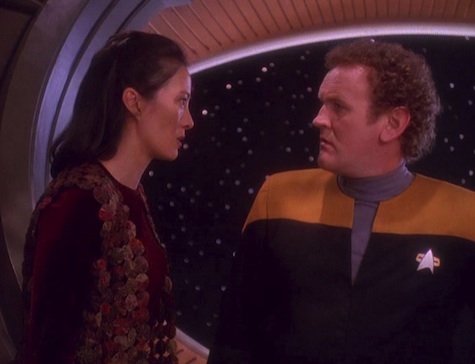
Then we have Worf. He’s been kicked out of his homeland for the second time, only this time it’s worse. After “Sins of the Father,” he had Kurn in his hip pocket as a backup plan, since his being part of the House of Mogh was hidden. He doesn’t have that this time, and this particular exile feels more permanent. He’s tried to be an ideal Klingon and had those ideals thrown back in his face repeatedly. So when he sees Grilka, he sees exactly what Dax says he sees: a statue. Or, more generally, an idea. If he woos Grilka, maybe he can still consider himself to be the Klingon that Gowron says he isn’t.
As for Grilka, we’ve got a rarity in the empire: a woman who’s the head of a House. Things are going badly, and the only person she can really trust is the Ferengi who bailed her out last time. As for Quark, we’ve seen repeatedly that he desires strong women. After being raised on a world that devalues women, he has repeatedly gone after women who wouldn’t put up with Ferengi restrictions on females for a nanosecond: Natima Lang, Vash, Rionoj, Pel, Kira, Dax, and now Grilka. She’s his kind of woman, and he is a romantic at heart (we’ve seen that over and over), so he does what he has to in order to win her affection.
And then there’s poor Dax, who’s been flirting with Worf since they sparred with bat’leths in “The Way of the Warrior.” She obviously finds Worf hot, and has from jump, and all it took to get him to notice was a simple clubbing on the head.
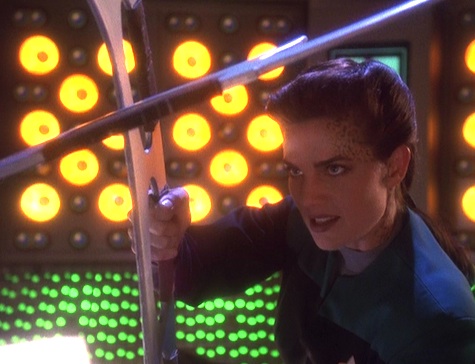
Ultimately, this is a charming little Cyrano pastiche that works because the characters that we’ve gotten to know pretty well are all completely in character here. Plus, it gets the Worf-Dax relationship going, which will be tremendous fun going forward…
Warp factor rating: 7
Keith R.A. DeCandido reminds everyone that his latest Star Trek book The Klingon Art of War is now on sale. You can get the book at your local bookstore or order it online from Amazon, Barnes & Noble, Indie Bound, or directly from the publisher, or comment on this post right here on Tor.com to win a free copy of the book. He’s talked about the book on the podcasts Trek Radio, the G & T Show, and SciFi Diner. He’ll be doing three signings for the book in May: at Singularity & Co. in Brooklyn, New York tonight at 7pm, at Pandemonium Books in Cambridge, Massachusetts on Thursday the 15th; and at the Enigma Bookstore in Queens, New York on Saturday the 17th.










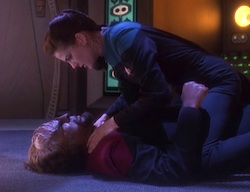
“This episode was the sole item cited in Steve Lyons & Chris Howarth’s Completely Useless Unauthorized Star Trek Encyclopedia‘s entry for “Sex.”
I’ll bet that left Kirk, Riker, Deltans, the inhabitants of Risa, TOS’s “Amok Time,” TNG’s “Manhunt” and VGR’s “Favorite Son” feeling very underappreciated. (Of course, the less said about that last one, the better!)
This is a really fun episode and one of the best titles in all of Trek. (And you forgot to mention that it parodies a well-known country song.) The humor works extremely well, perhaps because unusually for most of 90s Trek it grows from the characters and is more subtle. Bashir askin O’Brien if he’s peeked also has an extra degree of humor in, since Alexander Siddig most certainly has peeked and a whole lot more.
Armin Shimmerman also deserves kudos for his physical comedy. It can’t be easy pretending to be controlled by somebody else and to make that control occasionally look buggy. He does an excellent job here.
Quark’s attraction for strong women goes back to his mother, Ishka (“Family Business”, others). It’s the old cliche of being attracted to women who in some way resemble one’s mother.
Thanks for mentioning “…Loved I Not Honor More,” Keith. I wrote that story because it frustrated me that this episode ended with Quark winning Grilka but then the plot thread was never mentioned again and its absence was never explained. It was one of the rare bits of TOS-style non-continuity in the generally tighter DS9. And since the brief of the Prophecy in Change anthology was basically to fill in such lingering gaps, I gravitated to this one. I was struck by the way Quark basically compromised his own values and tried to remold himself to fit the object of his affections, and I realized that a relationship like that was basically doomed. I tried to explore how Ferengi values were just as strongly defined a code of honor in their own way as Klingon values were, and how it wasn’t healthy for Quark to just play along with Grilka’s assumption that they were intrinsically inferior.
As for the O’Briens/Kira subplot, I actually love how mature Keiko is about the whole thing. She’s not being eaten up by jealousy and suspicion — she actually trusts her husband and her friend/surrogate without reservation. She’s secure and happy enough in her marriage that she’s not neurotically afraid of threats to it. That’s a kind of maturity it’s rare to see in TV marriages. I hate the way married couples in fiction are so often portrayed as being consumed by kneejerk jealousy, because I don’t see how a relationship can possibly work if it isn’t predicated on trust.
About Moore, humor, and Galactica: I actually preferred the BSG episodes Moore scripted himself, because they had more humor to balance out the tone, whereas the episodes from other writers tended to wallow more in incessant darkness and dismalness and “Oh, look how smart and serious we are” self-consciousness.
(It’s also something that could’ve been solved by a simple conversation with Keiko, who is, after all, a grownup, but I’ve often found that a mature relationship is the last thing one should expect from TV writers, especially the writers of the O’Brien marriage.)
I don’t care how evolved 24th century humans are, “Dear, I’m developing romantic feelings toward the sexy surrogate who moved in with us to have my baby” is never going to happen. Especially not with O’Brien who is way more happy with a spanner than with feelings.
I’m not sure why, but I really didn’t care for the Worf/Dax romance storyline. That makes this one of my least favorite episodes. Did we really need yet another cringeworthy ripoff of Cyrano de Bergerac? Moore was one of my favorite writers but he also wrote the episodes I enjoyed the least – this one and “Change of Heart” in season 6.
After being raised on a world that devalues women, he has repeatedly gone after women who wouldn’t put up with Ferengi restrictions on females for a nanosecond: Natima Lang, Vash,Rionoj, Pel, Kira, Dax, and now Grilka. She’s his kind of woman, and he is a romantic at heart (we’ve seen that over and over), so he does what he has to in order to win her affection.
Why am I not surprised that Quark lusts for women who remind him of his mother?
There’s truth in saying that all writers delve into Freudian themes.
That last picture, with Dax, looks like it was taken in the Tardis. I know it’s a holosuite, but it seriously looks like the Tardis interior.
Now I can’t stop thinking of Dax seducing Worf with a bat’leth fight while the Doctor goes, “No! No! NOO!”
That’s a kind of maturity it’s rare to see in TV marriages. I hate the way married couples in fiction are so often portrayed as being consumed by kneejerk jealousy, because I don’t see how a relationship can possibly work if it isn’t predicated on trust.
@@.-@
Because it generates easy and cheap conflicts. Ross and Rachel on Friends is probably the prime example of a rocky/jealous relationship that could never work in reality. It’s definitely more rewarding to try and develop conflict, while avoiding the easy path.
I tried to explore how Ferengi values were just as strongly defined a code of honor in their own way as Klingon values were, and how it wasn’t healthy for Quark to just play along with Grilka’s assumption that they were intrinsically inferior.
I imagine it must have been a challenge to write that story, especially after DS9 released the atrocity known as Profit and Lace. I know I’d think twice before writing stories about Ferengi values, especially coming on the heels of that particular episode.
About Moore, humor, and Galactica: I actually preferred the BSG episodes Moore scripted himself, because they had more humor to balance out the tone, whereas the episodes from other writers tended to wallow more in incessant darkness and dismalness and “Oh, look how smart and serious we are” self-consciousness.
Ironically, my favorite example of humor from the series — the paper shortage joke from “The Passage” –was scripted by Jane Espenson rather than Moore.
I should probably give the Kira/O’Brien thing in this episode another chance, but I remember it just bugging me and making me wish it didn’t keep interrupting the A-plot which I really enjoyed. However, I think a lot of that is because I just found the whole “Kira is carrying Keiko’s baby” thing annoying from the word go and couldn’t wait for it to go away. I realise it was done for the sake of expediency, but that didn’t stop it irritating me and getting in the way of my enjoyment of any episode where it was given prominence.
On fun piece of trivia that was left out:
At the beginning when Dax is explaining “House of Quark” to Worf, at the end of that sequence Sisko comes up and remarks about he is surprised to hear Worf is infatuated with someone. Dax responds: “Stranger things have happened.” Sisko replies “Especially around here” and he holds up his baseball, which is a callback to the imagination aliens from “If Wishes Were Horses”.
Another favorite. After the seriousness of previous episodes, I loved the fun of this one. There are a lot of great moments here.
Bobby
Quark checks into the infirmary with multiple scratches, fractures, and contusions, alongside Grilka. Bashir asks what happened, and then rescinds the question, not wanting that image running around in his head. Worf and Dax then enter in a similarly battered state, prompting Bashir to decide to never ask anyone what happened to them ever again.
i really liked that part.
and i agree with StrongDreams, i can’t imagine that conversation happening & if it did, it wouldn’t go well.
This wasn’t one of my favorite eps. I didn’t like the Worf-Dax romance any more than I liked the Worf-Troi one. Just – meh. Had no interest in the Grilka-Quark storyline either; just couldn’t buy what was being sold. It happens.
The Kira-O’Brien segment of the episode was well-done and rather believable though. For that alone, I’d give the ep a 5.
You know, as I read this, I really want to like this episode, but there’s just something about the entire Cyrano storyline that irks the crap ou of me. And it’s not just this one, it’s EVERY one. Doesn’t matter if it’s a tv show or a movie version, you can even hand it to Steve Martin, doesn’t matter. All I do the entire time is fight the urge to yell at the screen and tell him (or her) to man up and talk to the love interest himself. And I’m a romantic at heart, I love me some love stories, there’s just something about it that rubs me the wrong way.
I did enjoy the interplay between Kira and O’Brien, though, so there is that.
Anyone interested in catching up on the original Cyrano de Bergerac play could do worse than checking out the French film version starring Gerard Depardieu. Great stuff complete with, if memory serves, English subtitles by Anthony Burgess no less.
@16: But isn’t that the point of a Cyrano-type story? The idea is that both men are making a mistake, one by pretending to be someone he isn’t, the other by hiding his true feelings out of insecurity. The resolution is when they both recognize their mistakes and stop resorting to lies. (Although here, Quark didn’t take that step — but he eventually did in “…Loved I Not Honor More.”)
Congrats on the new book Keith!
Loving these rereads even if I dont comment much… DS9 was a great show. Love these characters
Quoth Jack of Midworld: “All I do the entire time is fight the urge to yell at the screen and tell him (or her) to man up and talk to the love interest himself.”
Uhm, Worf tried that, and Tumek cut him off at the pass and made it clear that his advances were not welcome. He only helped Quark out because it was the only way he could prove to himself that he could’ve wooed Grilka if he was given half a chance.
But he “manned up” from the git-go. So that particularly criticism isn’t at all fair given what actually happened in the episode.
—Keith R.A. DeCandido
a-j is correct, the Gerard Depardieu Cyrano is magnificent. It’s the second-best production of the play I’ve ever seen. The best was a stage production in New York featuring Derek Jacobi in the title role that I saw decades ago….
—KRAD
Chris & krad – that’s the thing, there’s just something about the entire Cyrano story concept that gets to me. I wasn’t even trying to be critical of the ep (all things being equal, I actually like that Quark and Worf both got who they were ‘supposed’ to get, rather than having Worf step out of the shadows and get Grilka at the last minute), it was more me trying to explain what my brain does when I bump into any Cyrano storyline. I think it’s combination of the situation feeling contrived to me (even though I know that all fiction – being created by somebody else – fits the exact definition of contrived) and, I dunno, wanting the guy to get the girl (or the girl to get the guy, or the guy to get the guy, etc) on his own, not through deception, however well-intentioned. I recognize it’s a definite “it’s me, not you” sort of thing and and may not be exactly rational, but I’m going to stop babbling now.
My main memory from when this episode originally aired is of how many people on the alt.* Usenet newsgroup for DS9 were excited at the possibility of the series exploring some kind of polyamorous relationship via the Keiko/O’Brien/Kira storyline, little knowing that none of those dynamics would come up again later on.
@22: But like I said, that’s the whole point. We’re not supposed to approve of the deception. The fact that the characters are doing the wrong thing is the source of tension in the story. We’re supposed to want them to stop hiding behind lies and be glad when they’re finally honest about themselves.
24 – One of my favorite parts of tor.com is getting somebody else’s POV on things that I’ve already watched or read; sometimes it points out things I miss, sometimes it makes me reevaluate or at least consider what I take away from my entertainment. You guys feel so strongly about this, maybe I can track down the French version that a-j mentioned above, see if it makes a difference in my own POV.
Quoth Edgar: “My main memory from when this episode originally aired is of how many people on the alt.* Usenet newsgroup for DS9 were excited at the possibility of the series exploring some kind of polyamorous relationship via the Keiko/O’Brien/Kira storyline, little knowing that none of those dynamics would come up again later on.”
I’m stunned that anyone thought that was even a possibility, given how incredibly conservative onscreen Trek has always been regarding relationships…….
—Keith R.A. DeCandido
krad @26 – if I recall those Star Trek newsgroups correctly, they had a considerable number of people heavily invested in the idea of a Kirk+Spock relationship. Reality wasn’t exactly their strong point. :)
@26: But this was DS9, the show that had just had an onscreen same-sex kiss the year before! I’m not saying I thought it was a realistic possibility, either, but I could see where they were coming from–it was more than some slash fans taking a random moment between two male characters as “proof” of their sexual relationship.
To be fair to them on another front, it wasn’t as if they knew that two more series would come and go without any more progress in how relationships were portrayed.
Folks, I’m under several deadline guns right now, so the rewatch of “Nor the Battle to the Strong” won’t go up until Wednesday. My apologies. We should be back on track for “The Assignment” on Friday.
—Keith R.A. DeCandido
I have to say that my first thought too after the Kira/O’Brien massage scene was, “whoo boy, wouldn’t it be cool if they addressed polyamory here?”. Considering that polyamory has gradually become less of a taboo during the 21st century, you’d think it wasn’t a taboo at all in the 24th? But Krad is right, even though the Federation is supposed to be some kind of progressive utopia, it seems the general attitudes of its inhabitants towards sexuality and intimacy are remarkably conservative.
I just remembered this was the only DS9 episode directed by Andrew Robinson.
For whatever reason, he never went back to the director’s chair after this one, at least not on DS9. One wonders why. He did move on to direct two Voyager episodes, after this. A pretty good one (the B’Elanna Pon Farr episode), and a pretty forgettable one (some season 4 episode I barely remember).
I guess the directing roster was too crowded at this point for DS9. Too many fresh directors and no available slots.
@31 The second Voyager episode directed by Andrew Robinson is, ironically, the one about those xenophobic aliens who wipe out the memories of everyone they meet. I guess it worked with you, heh? ;-)
As kind of crazy and weird as this episode is, I quite enjoyed it and was even kind of rooting for Grilka/Quark. And I agree that he definitely has a tendency to seek out/admire strong women, despite his bluster about Ferengi traditions.
The Miles/Kira stuff was really just a bit squicky (although they played it humerously) and a little hard for me to relate to. Is this something that typically happens with surrogates, or is the idea just supposed to be that because they live together, they started to get to know each other more intimately? While I agree it was refreshing to see Keiko NOT a super jealous and posessive wife, she is a bit lacking in perception – it seemed rather obvious her husband was uncomfortable! Agreed that, like most storylines, if people could just have an adult conversation, the tension would be diffused. But that wouldn’t be entertaining, I suppose.
As for Dax and Worf, I’m kind of meh on their relationship, although the end did bother me a bit since (despite the viewer knowing it’s presumably consesual) it was just a little disturbing to see her all covered in bruises (same thing goes for Quark) and more or less played for laughs (ha ha ha, Klingons are so passionate). And yes, I know that there are people who enjoy pain with their pleasure and that’s their business if it’s consensual, but the whole sex/violence connection is not one I’m personally fond of.
@32
Apparently so. I just remembered it involved Chakotay.
And the plot as you describe is step-by-step the exact same plot as the TNG episode Clues (xenophobic aliens erase their memories). I guess the writers really were running out of ideas by that point.
I’ve been waiting for you to get to this one… I was torn between whether I thought you’d like it or hate it. It’s not often that Trek gets funny episodes right, even less often that they don’t make a mess of romance episodes (though there’s a doozy coming up soon…) so this one was fun on both accounts.
I have to admit to FF past the Kira/Miles stuff. It makes sense, I guess, but it kind of weirded me out.
And I agree with Lisamarie. If they’d left the whole sex/violence thing with what we saw here, then it wouldn’t have been too bad but I think they went too far, especially in that episode coming up that I don’t like to talk about.
@34: It wasn’t that similar to “Clues.” Here, the aliens secreted a pheromone that naturally kept other species from forming long-term memories about them (as a defense mechanism, I guess?). Conveniently, it also blocked sensors from recording them. One of them had come aboard the ship and had a whirlwind romance with Chakotay, which he’d forgotten soon after she left. The episode was about her coming back and reminding him of what they’d shared. It was a love story rather than a mystery.
Lisamarie@33, no it does *not* happen with surrogates, *holy wombats* does it not ever happen with surrogates, surrogacy is a *business* relationship. (And in this case, with the surrogate a co-worker chosen in emergency, that goes double.)
That whole plotline was not so much unbelievably creepy and squicky — though it was — but so implausible that it had me wondering if DS9 had any adult female humans on the staff, or had ever *talked* to any, or had ever even *met* any.
This was officially the first episode of DS9 that had me laugh out loud. Several times. Also, I’d say this was Armin Shimerman’s best performance so far. You can actually sense Andrew Robinson’s directorial influence here.
What I really can’t fathom is why Klingon culture, which has repeatedly valued female Klingons as complex warriors both scheme-y (the wretched sisters) and honourable ( K’Ehleyr got mad respect, and she wasn’t even full Klingon!) And then write in this STUPID parallel to human and fernegi culture that devalues women. Why would a Klingon warrior not be able to run her own house if she earned it? I’ve always loathed that the writers added sexist oppression of women to so many of the species here as a default. As though women being devalued were a repeating truth of nature. And on Klingon culture? It feel inconsistent and tacked on.
@39/Ron D.: The idea that the Klingons are a sexist society was not “added” by DS9’s writers; it was established in The Making of Star Trek in 1968. From p. 257 thereof: “They have no patience with women, even their own, and treat them as sometime [sic] useful animals.” Indeed, it was implied even earlier in “The Trouble With Tribbles,” when Koloth said “We do not equip our ships with — how shall I say it — non-essentials,” miming a female figure with his hands. Of course, “Day of the Dove” then gave us Mara and a female extra in Kang’s crew, contradicting this. And some movies and episodes have featured all-male Klingon crews while others have had mixed crews. So the overall impression is that women can achieve status in the military if they’re good enough, but males are still dominant.
For that matter, TNG‘s “Redemption” established that women couldn’t serve on the High Council.
—Keith R.A. DeCandido
@41/krad: After “Reunion” had shown Gowron offering K’Ehleyr a seat on the Council as a bribe. So TNG has been as inconsistent about women’s status as TOS was. (And yes, of course that can be retconned as Gowron offering to lift the ban on women, but I doubt that was the intention when the line was written. TNG’s writers didn’t establish the ban until it was convenient to the plot.)
I don’t see any comments approving of the Dax Worf romance. So let me be the first. I actually think they make a great couple. The Dax character has changed more than any of the other main characters since the start of the series, and I like her. Worf is a lucky guy.
Grilka might have been attracted to Worf since she likes unusual men so I disagree with what Tumek said. “So he challenges Quark to a duel because Klingons”; what happened there KRAD? Although I love the Dax/Worf relationship, Let He Who Is Without Sin is surely the one episode that failed to make anything of it. This is the only episode where Andrew Robinson gets to direct Michael Dorn and since they always get along so well, that’s a shame.
All I could think of was “Leisure Suit Larry Goes Looking for Love (in Several Wrong Places)”, lol. Yes, this is quite a funny episode for what it is. Somehow felt very much like a soft porn episode (which is very fitting, since Leisure Suit Larry first came to life in a game called “Softporn Adventure”).
Armin Shimerman could have been a great Larry (although Steve Carrell was born the role).
Lockdown Rewatch. Great fun, I particularly enjoyed Armin Shimmerman being dragged around the holosuite by the bat’leth some great mixes of comic genres, from the comedy of awkwardness with Kira and O’Brien, romantic comedy with Quark and Grillka, to slapstick in the holosuite. This is most memorable for finally Worfand Dax getting together a long time coming and what a great and eventually tragic ride it will be.
Okay, so- while I very much enjoy Keith’s reviews, I’m bothered how he’ll slash so many points if he doesn’t like the ending, even if it’s just one scene.
Well, mea culpa, because the ending ruins it for me.
I just really don’t like the idea of Quark tricking Grilka. I don’t know if they could ever make it work as a full time couple, but as friends- or friends with benefits, heh- they really clicked. Grilka can be cunning and sly. Quark can be brave and honorable. They loudly proclaim to despise the other’s values, but that doesn’t mean they don’t see the value in them.
I really wish they ended it on a different note than “Quark pulls a con.” Like, I don’t know, he finds a middle ground that appeals to both parties. Say, here’s a trade expedition into dangerous space, and they’re willing to pay top dollar for brave warriors like Grilka’s house to protect it. A chance to earn coin and honor at the same time, and pitch it as preparing her house for future battles.
john: You must hate Cyrano de Bergerac, then….
—Keith R.A. DeCandido
I get what you mean, there! But no, because they’re different stories. Cyrano’s a tragedy, brought about because the main character is too proud to accept that his love interest could love him back. The episode’s a lighthearted romance where Quark tries to get into his ex-wife’s pants.
And for most of the episode, it works! Quark takes time and effort to learn about Grilka- what she wants, what she likes, what she values. And then Quark’s big speech on value and profit- that works too. He has his values and interests that he’s not going to toss aside, but he recognizes Grilka’s values as well. They may not be able to make a marriage work, but they still love each other to meet each other in the middle.
It’s just… if Grilka acknowledged the con, or Quark confessed, or something, it wouldn’t annoy me so.
And I realize, I haven’t said a thing about Worf and Dax in this episode, even though it’s about them. I guess that’s because I really love House of Quark and Grilka their plot feels truer to both characters? Plus it feels like an equal partnership here, both Worf and Dax planning and contributing.
Sorry, let me try again. I like that Quark is pursuing Grilka by going to the too-honorable-for-Klingons guy (who he really doesn’t like!) so he can woo his hot Klingon ex-wife. I like how he explains it transactional terms- it’s honest. And it’s sweet, because Quark wouldn’t do this for just latinum, but he’ll do it for Grilka.
I just don’t like the duel because Grilka feels like the mark instead of a partner. Does that make sense? Her first episode, they were completely honest with each other, even when Quark tried to bail. Now he’s lying to her.
@51/john: As I mentioned in comment #4, the way I spun it in “…Loved I Not Honor More” is that Quark was lying to himself more than Grilka. He was trying to change himself to fit her expectations, and had to realize he needed to be true to his own values. I was basing it on an old friend of mine, a self-styled hippie type who got too involved with a rich conservative girl and kind of lost sight of his values for a while.
But I can totally see your point about the episode itself — it does kind of reduce Grilka to a conquest and rewards Quark for tricking her. Add it to the list of “Things about DS9 that are much more sexist than I realized at the time.”